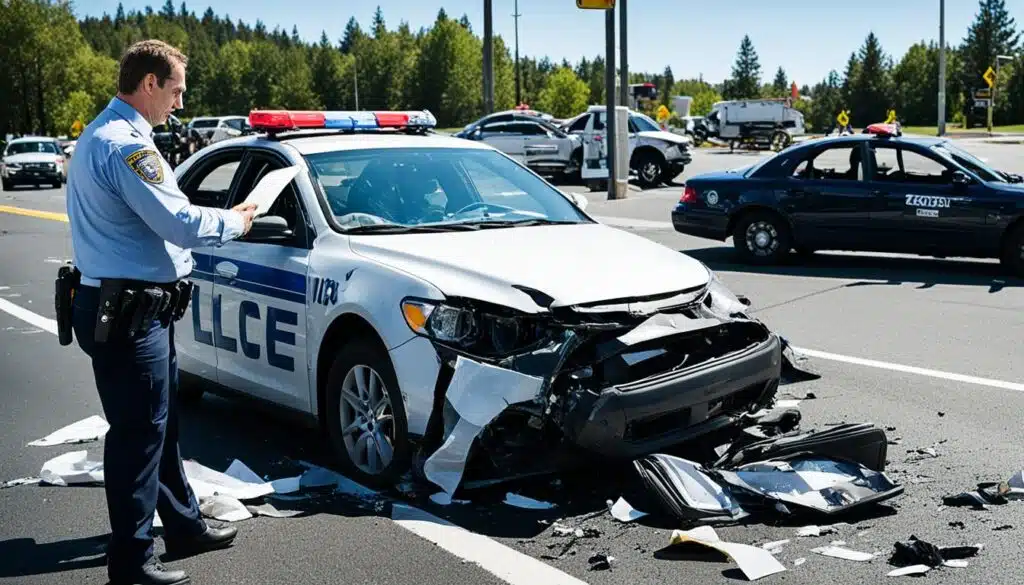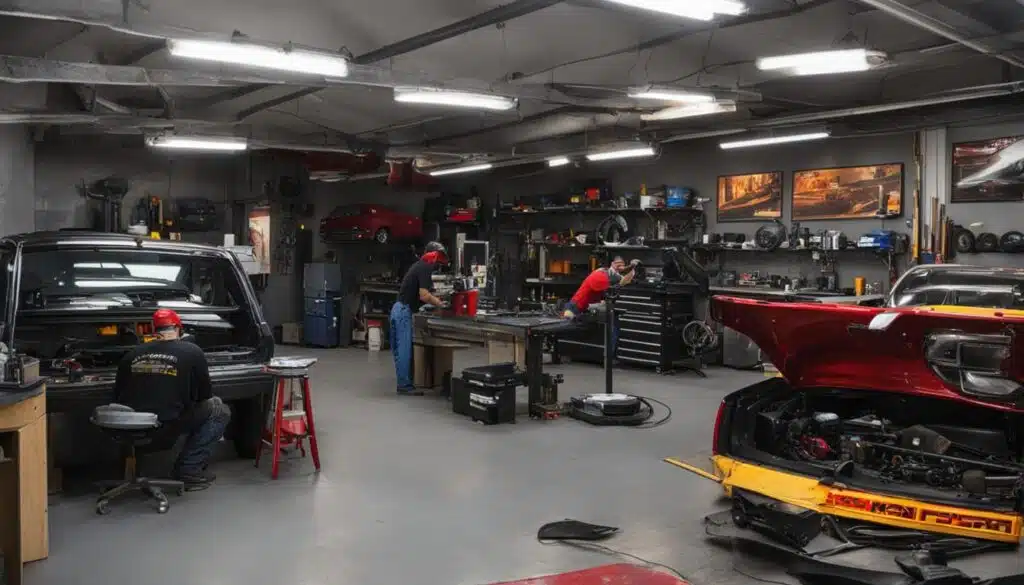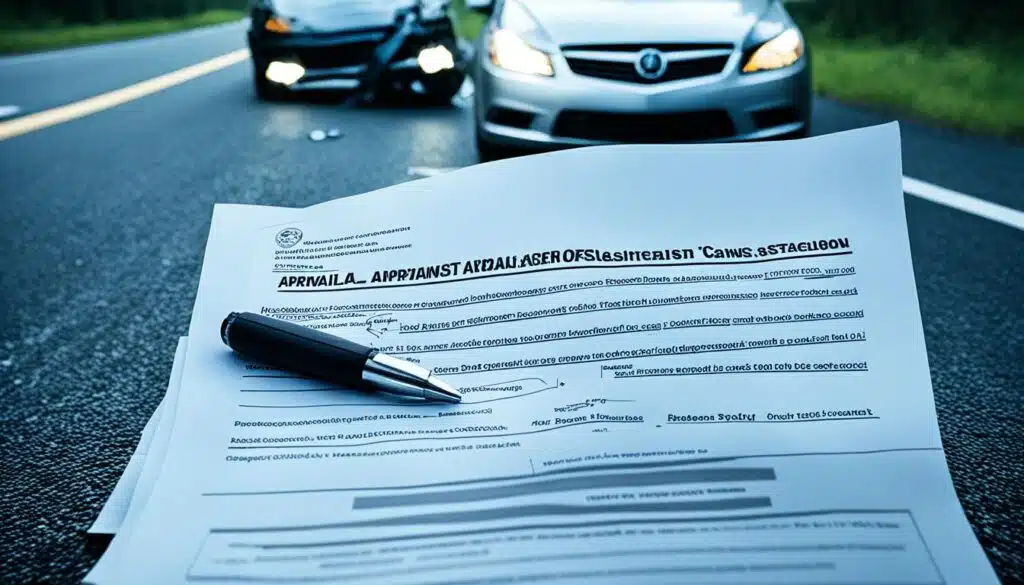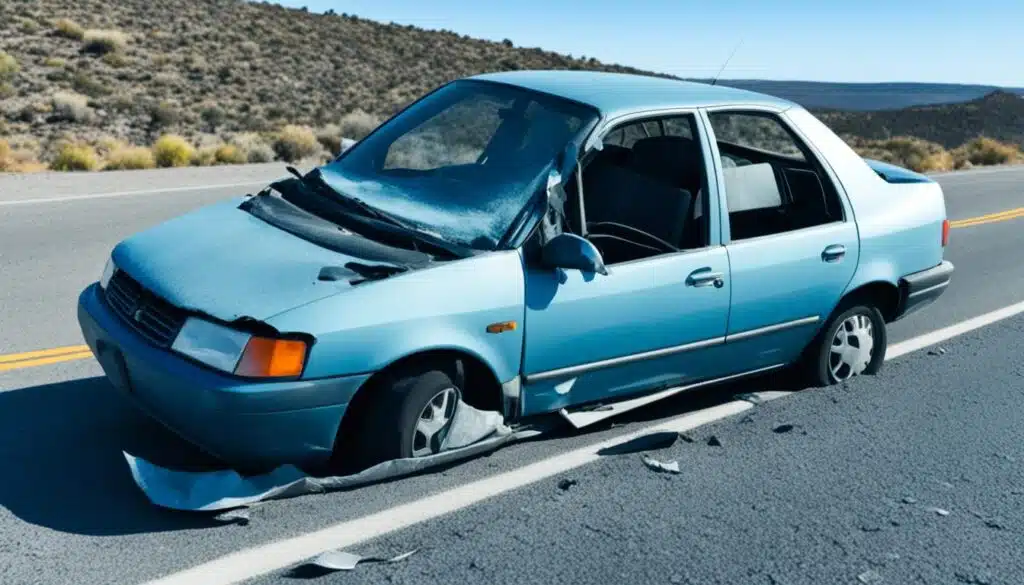Dealing with the aftermath of a car accident can be a stressful and overwhelming experience. In addition to addressing any injuries and vehicle damage, navigating the complexities of car accident insurance can pose its own set of challenges. It’s essential to understand how to effectively file a claim, communicate with your insurance company, and ensure proper coverage. This article provides expert tips and guidance to help you navigate the road to recovery after a car accident.
Key Takeaways:
- Understanding your car accident insurance coverage is crucial for protecting against financial losses.
- Document the accident scene, seek medical attention, and report the accident to the police.
- Filing an insurance claim requires specific information and documents.
- Fault in an accident can impact insurance coverage and claims.
- Select a reputable repair shop and understand the costs involved in repairing your vehicle.
Understanding Car Accident Insurance Coverage
When it comes to car accidents, having the right insurance coverage is essential for protecting yourself from potential financial losses. Auto insurance policies provide coverage for accidents, and it’s important to understand the different types of coverage available to you.
Collision Coverage
Collision coverage is a type of auto insurance that covers the cost of repairing or replacing your vehicle if it is damaged in a collision, regardless of who is at fault. This coverage helps pay for the repairs or replacement of your vehicle, up to the coverage limits specified in your policy.
Having collision coverage is particularly important if you have a newer or more expensive vehicle, as it can help you avoid significant out-of-pocket expenses in the event of an accident.
Liability Insurance
Liability insurance is another crucial part of your car accident insurance coverage. This coverage protects you financially if you cause an accident that results in damage to another person’s property or injuries to another individual.
If you are found at fault for the accident, liability insurance can help cover the costs of property repairs, medical expenses, and legal fees associated with any resulting lawsuits. It is required by law in most states and is typically expressed as two separate coverage limits: one for bodily injury liability and one for property damage liability.
Accident Insurance
Accident insurance is a supplemental insurance option that can be added to your auto insurance policy to provide additional protection in case of an accident. This coverage can help pay for medical expenses, lost wages, and other costs associated with injuries sustained in a car accident, regardless of who is at fault.
Accident insurance can be especially beneficial if you do not have health insurance or if your existing health insurance coverage is limited.
Understanding the different types of car accident insurance coverage is crucial for ensuring that you have the appropriate level of protection. By having collision coverage and liability insurance, you can safeguard yourself from potentially significant financial burdens resulting from a car accident. Additionally, accident insurance provides an extra layer of protection for you and your passengers in the event of injuries.
Next, we will explore the steps you should take immediately after a car accident to protect yourself and begin the claims process.
Steps to Take After a Car Accident
Being involved in a car accident can be a stressful and overwhelming experience. Knowing what steps to take immediately after the accident can help ensure your safety and protect your interests. If you find yourself in this situation, follow the accident checklist below for a smooth post-accident process.
1. Ensure Your Safety
Your safety and the safety of others involved should be your top priority. If possible, move your vehicle to a safe location away from traffic to prevent further accidents. Turn on your hazard lights and use pylons or flares to warn other drivers.
2. Call the Police
Reporting the accident to the police is vital, especially if there are injuries, significant property damage, or conflicting accounts. The police report will provide an official record of the accident and help in resolving any disputes that may arise later.
3. Document the Accident Scene
Take photos of the accident scene, including the positions of the vehicles involved, any damage sustained, and any relevant road conditions. This documentation can support your insurance claim and provide evidence in case of disputes.
4. Exchange Information
Exchange contact and insurance information with the other driver(s) involved. Note down their full name, phone number, address, driver’s license number, license plate number, and insurance company details. Be polite and cooperative during this process.
5. Seek Medical Attention
If you or anyone else involved in the accident has sustained injuries, seek immediate medical attention. Even if the injuries seem minor, it’s crucial to get checked by a medical professional. Document all medical treatments, as they may be necessary for future medical payments or insurance claims.
6. Notify Your Insurance Company
Report the accident to your insurance company as soon as possible. Provide them with all relevant details, including the report of the accident made by the police. Be honest and accurate in your statements to avoid complications during the claims process.
“Being prepared and taking the right steps after a car accident can make a significant difference in your recovery process and ensure a fair resolution of your insurance claim.”
By following these steps, you will be better prepared to handle the aftermath of a car accident effectively. Remember to remain calm throughout the process and consult with an experienced attorney if necessary. Taking the proper actions will help protect your interests and ensure a smoother recovery.
Filing an Insurance Claim
When you’re involved in an accident, filing an insurance claim is a crucial step towards getting the compensation you deserve. The insurance claim process helps to ensure that you receive the necessary financial support to cover damages, medical expenses, and other losses resulting from the accident. Here’s a step-by-step guide on how to navigate the claims process:
Gather the necessary information
Before filing your insurance claim, gather all the relevant information about the accident. This includes the details of the other parties involved, such as their insurance company and policy number. Additionally, collect any evidence you have, such as photographs of the accident scene and witness statements. This information will be vital in supporting your claim and providing evidence of the damages involved.
Contact your insurance company
Once you have all the necessary information, contact your insurance company to initiate the claims process. Provide them with a detailed account of the accident, including the date, time, and location. Be prepared to answer any questions they may have about the incident. Your insurance company may assign a claims adjuster to handle your case and guide you through the process.
Document the damages
Take photographs of any damage to your vehicle and any other property involved in the accident. If you have any visible injuries, document those as well. This evidence will strengthen your claim and help the insurance company understand the extent of the damages.
Get a professional appraisal
In some cases, the insurance company may require an appraisal of the damages to your vehicle. An appraisal is an assessment of the cost to repair or replace your vehicle. It is conducted by a qualified appraiser who will provide an estimate of the repairs or replacement value. This appraisal helps the insurance company determine the amount of compensation you are entitled to.
Follow the claims process
Throughout the claims process, be sure to follow any instructions provided by your insurance company. Submit any required documents promptly and accurately. Stay in regular communication with your claims adjuster and provide any additional information they request. This will help expedite the resolution of your claim.
Stay informed
Keep track of the progress of your claim by maintaining regular contact with your insurance company. Inquire about any updates or additional information they may need. Staying informed will ensure that you have a clear understanding of the status of your claim and can address any issues that may arise.
By following these steps and providing accurate and timely information, you can navigate the insurance claim process with confidence. Remember to document all damages, communicate effectively with your insurance company, and stay informed about the progress of your claim. This will help ensure a smoother and more efficient resolution to your insurance claim.
Determining Fault in an Accident
One of the crucial aspects of dealing with a car accident is determining fault. Establishing fault is vital for insurance purposes and can influence the outcome of a claim. Several factors are taken into account to determine fault in an accident, including driver’s licenses, police reports, and other evidence.
When involved in an accident, it is essential to exchange driver’s license information with the other party. This information helps identify the drivers involved and ensures accurate documentation. Driver’s licenses play a significant role in determining fault as they provide vital information about a driver’s history and qualifications.
Additionally, police reports play a crucial role in establishing fault. When the police arrive at the accident scene, they gather information, interview witnesses, and document the incident. The police report includes details such as the location, time, and circumstances of the accident. Insurance companies heavily rely on police reports when determining fault for the accident.
“The police report is a valuable piece of evidence when determining fault in a car accident. It provides an unbiased account of the incident and helps insurance companies assess the situation.”
Fault for the accident can be assigned to one or more parties involved. Insurance companies analyze the evidence, including the police report and any additional information provided by the drivers, passengers, and witnesses. Based on this analysis, they determine the percentage of fault for each party.
Understanding fault is crucial because it affects insurance coverage. In states with a fault-based insurance system, the at-fault driver’s insurance typically covers the damages. On the other hand, in no-fault insurance states, each driver’s insurance company is responsible for covering their policyholder’s damages, regardless of fault.
Determining fault in an accident is a complex process that requires careful examination of multiple factors. By considering driver’s licenses, police reports, and the evidence presented, insurance companies can accurately assign fault and proceed with appropriate coverage and claims processing.
Example Table:
| Fault Assignment | Insurance Coverage |
|---|---|
| Driver A – 70% Fault | Driver A’s Insurance covers 70% of the damages |
| Driver B – 30% Fault | Driver B’s Insurance covers 30% of the damages |
Understanding how fault is determined and the subsequent impact on insurance coverage is essential for anyone involved in a car accident. By knowing the role driver’s licenses and police reports play, individuals can better navigate the claims process and ensure proper coverage for damages.

Repairs and Vehicle Damage
After a car accident, it’s essential to address the damage to your vehicle promptly. Finding a reputable repair shop can ensure that your vehicle is restored to its pre-accident condition.
Damage to your vehicle:
Before you start looking for a repair shop, assess the damage to your vehicle. Take note of any visible damages, such as dents, scratches, or broken parts. Documenting the damage will be helpful during the repair process.
Choosing a repair shop:
When selecting a repair shop, consider factors like reputation, expertise, and customer reviews. Look for a shop that specializes in the type of repairs your vehicle requires. Checking for certifications, such as ASE (Automotive Service Excellence), is also recommended.
Estimating repair costs:
Contact different repair shops to obtain quotes for the repair work. Make sure to provide accurate information about the damage when requesting estimates. Keep in mind that some damages may have hidden costs that only become apparent once repairs are underway.
Insurance coverage:
Before proceeding with the repairs, consult your insurance company to understand the coverage available for damage repair. Review your policy to determine if there are any specific requirements or limitations.
Approval process:
Many insurance companies require approval before repairs can begin. Document the damage, gather the necessary documentation, and reach out to your insurance company to initiate the approval process. Be prepared to provide photographs, estimates, and any other required documentation.
Managing repairs:
While your vehicle is being repaired, stay in touch with the repair shop for updates on progress. They should also inform you of any additional repairs that may be necessary. Review the final repair bill for accuracy before making any payments.
Remember, choosing a reputable repair shop and understanding the costs involved in repairing your vehicle are crucial steps towards a successful recovery after a car accident.

| Repair Shop Factors | Repair Shop A | Repair Shop B | Repair Shop C |
|---|---|---|---|
| Reputation | Excellent | Good | Fair |
| Expertise | High | Medium | Low |
| Customer Reviews | 4.9/5 | 4.3/5 | 3.7/5 |
| Certifications | ASE | None | None |
| Repair Cost Estimate | $2,500 | $2,200 | $2,800 |
| Insurance Approval | Yes | Yes | Pending |
Dealing with Insurance Companies
When navigating the claims process after a car accident, effective communication with insurance agents and companies is crucial. By providing accurate and necessary information, you can facilitate the resolution of your claim efficiently. Here are some essential tips to help you deal with insurance companies:
Gather Insurance Information
Before contacting your insurance company, gather all relevant insurance information, including the name of your insurance agent, the insurance company and policy number, and any other documentation related to your coverage. This information ensures that you have everything you need to reference during discussions with your insurer.
Stay in Contact
Keep an open line of communication with your insurance agent throughout the claims process. Respond promptly to any requests for additional information or documentation. Prompt communication can help speed up the processing of your claim and ensure a smoother resolution.
Be Accurate
When providing information to your insurance company, be sure to provide accurate and complete details about the accident. Include relevant information such as the date, time, and location of the accident, as well as a description of the events that occurred. Providing accurate information helps your insurer understand the circumstances surrounding the accident and process your claim accordingly.
“Accurate information is key when communicating with insurance companies. By providing all the necessary details, you can help facilitate a smooth claims process and ensure a fair resolution.” – Insurance Expert
Document Conversations
Keep a record of all conversations you have with your insurance company. Note down the date, time, and the name of the representative you spoke to. Documenting conversations can serve as a reference point if any discrepancies or issues arise during the claims process.
Follow Instructions
Follow any instructions provided by your insurance company regarding the claims process. This may include providing additional documentation, obtaining repair estimates, or scheduling an appointment with an appraiser. By following these instructions promptly, you can help expedite the resolution of your claim.
Seek Professional Assistance if Needed
If you encounter difficulties communicating with your insurance company or if your claim is denied or delayed, consider seeking professional assistance. Insurance agents and attorneys specializing in insurance claims can provide valuable guidance and support to ensure that your rights as a policyholder are protected.
Remember, effective communication with your insurance company is essential for a smooth claims process. By following these tips and providing accurate information, you can increase the likelihood of a fair and satisfactory resolution to your claim.

Resolving Insurance Disputes
Dealing with insurance disputes can be a frustrating experience, especially when you’re already dealing with the aftermath of a car accident. However, there are steps you can take to resolve these disputes and ensure a fair outcome. One option to consider is utilizing the appraisal provision in your insurance policy.
Understanding the Appraisal Provision
The appraisal provision is a process that allows an impartial third-party appraiser to assess the value of property damage or losses in dispute. This provision can be particularly useful when there is a disagreement between you and your insurance company regarding the extent of the damages or the amount of compensation you’re entitled to.
By invoking the appraisal provision, you can request an appraisal of the damages by an independent appraiser. The appraiser will evaluate the extent of the damages and provide a fair estimate, taking into account relevant factors such as the cost of repairs, market value, and depreciation.
When to Consider the Appraisal Provision
In situations where you and your insurance company cannot reach an agreement on the value of your claim, the appraisal provision can be a helpful tool to resolve the dispute. It provides an objective assessment of the damages and can help ensure that you receive a fair settlement.
Typically, the appraisal provision must be invoked within a certain timeframe specified in your insurance policy. Be sure to review your policy carefully to understand the specific requirements and deadlines for utilizing the appraisal provision.
Other Steps to Take in Insurance Disputes
In addition to considering the appraisal provision, there are other steps you can take to address insurance disputes:
- Review your insurance policy: Familiarize yourself with the terms and conditions of your policy, including provisions related to fault determination and claim resolution.
- Gather evidence: Collect all relevant documents and evidence to support your claim, such as photographs of the accident scene, medical records, and repair estimates.
- Maintain open communication: Keep a record of all communication with your insurance company, including emails, letters, and phone calls. This can help provide evidence of any attempts to resolve the dispute.
By taking these steps and considering the appraisal provision, you can work toward a satisfactory resolution of your insurance dispute and ensure that you receive the compensation you deserve.

Understanding Insurance Terms and Rights
When dealing with car accident insurance, it’s important to have a clear understanding of the relevant terms and your rights as a policyholder. This knowledge will empower you to make informed decisions and protect your interests. Here are some key insurance terms and rights to be aware of:
Deductible
A deductible is the amount you must pay out of pocket for repairs or other covered expenses before your insurance coverage kicks in. It’s important to review your policy to understand your deductible amount and how it applies to different types of claims. Keep in mind that choosing a higher deductible can lower your premiums but may increase your initial out-of-pocket costs in the event of an accident.
Uninsured Motorist Coverage
Uninsured motorist coverage provides financial protection if you’re involved in an accident with a driver who has no insurance or inadequate coverage. This coverage helps pay for medical expenses, lost wages, and other damages resulting from the accident. It’s a valuable safeguard, especially considering the significant number of uninsured drivers on the road.
Lost Wages
If you’re unable to work due to injuries sustained in a car accident, you may be entitled to lost wages compensation from your insurance company. This coverage helps offset the financial burden of being unable to earn income during your recovery period. Be sure to review your policy to understand the specific terms and documentation required to file a lost wages claim.
Also Read :- Infinite Security: Optimizing Universal Life Insurance For Long-Term Benefits
Replacement Vehicle
If your vehicle is severely damaged and needs extensive repairs or is deemed a total loss after an accident, your insurance policy may provide coverage for a replacement vehicle. This benefit can help ensure that you have reliable transportation while your damaged vehicle is being repaired or replaced. Review your policy to understand the terms and conditions surrounding the replacement vehicle coverage.
Having a clear understanding of these insurance terms and rights will help you navigate the claims process more effectively. Remember to review your policy carefully and consult with your insurance agent or representative if you have any questions or concerns.
| Insurance Term | Description |
|---|---|
| Deductible | The amount you must pay out of pocket before insurance coverage applies. |
| Uninsured Motorist Coverage | Protection if you’re involved in an accident with an uninsured or underinsured driver. |
| Lost Wages | Compensation for income lost due to injuries sustained in a car accident. |
| Replacement Vehicle | Coverage for a replacement vehicle while your damaged vehicle is being repaired or replaced. |

Understanding insurance terms and rights is crucial for effectively navigating the aftermath of a car accident. By knowing the ins and outs of deductibles, uninsured motorist coverage, lost wages benefits, and replacement vehicle options, you can make informed decisions and protect your financial well-being.
Conclusion
Understanding car accident insurance is crucial for a smoother recovery process. By familiarizing yourself with the different types of coverage and knowing what steps to take after an accident, you can navigate the claims process more efficiently.
When filing an insurance claim, make sure to provide accurate information and necessary documents, such as a police report and medical records. Effective communication with your insurance company is key, as it can help resolve disputes and ensure a fair resolution.
Remember to review your policy and understand your rights, including deductibles, uninsured motorist coverage, and benefits for lost wages and replacement vehicles. By being proactive and well-informed, you can protect yourself financially and receive the coverage you deserve.
FAQs
Q: What should I do immediately after being involved in an accident?
A: Make sure everyone is safe, call the police, exchange information with the other driver, and document the scene of the accident.
Q: How do I start the repair process after a car accident?
A: Contact your insurance company, schedule an inspection, and choose a reputable body shop for repairs.
Q: What is the role of the Department of Insurance in a car accident insurance claim?
A: The Department of Insurance regulates insurance companies and ensures they comply with laws to protect consumers.
Q: Do I need to inform my insurance company if I was involved in a minor fender bender?
A: Yes, it is important to report all accidents to your insurance company, regardless of the severity.
Q: How can I ensure my insurance policy covers the full amount of the loss after an accident?
A: Review your auto policy to understand your coverage limits and consider adding additional coverage if needed.
Q: What documents do I need to file an insurance claim after a car accident?
A: You may need your insurance card, driver’s license, vehicle registration, and any police reports or witness statements.
Q: Can I choose where my car is repaired after an accident?
A: In most cases, you have the right to choose the body shop where your car is repaired, as long as it meets insurance requirements.





